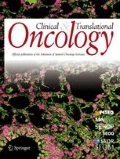Abstract
Introduction
The EORTC Quality of Life (QL) Group has developed a questionnaire -the EORTC QLQ-CR29- for evaluating QL in colorectal cancer. The aim of this study is to assess the psychometric properties of the EORTC QLQ-CR29 when applied to a sample of Spanish patients.
Materials and methods
Eighty-four locally advanced rectal cancer patients in the treatment follow-up period after receiving surgery and neoadjuvant chemoradiotherapy were included in the study. Seventy subjects also had adjuvant chemotherapy. Patients completed both the EORTC QLQ-C30 and the QLQ-CR29 once. The psychometric evaluation of the questionnaire’s structure, reliability, and convergent, divergent and known-groups validity was performed.
Results
Multitrait scaling analysis showed that three of the multi-item scales met the standards of convergent and discriminant validity. These same scales reached the 0.7 Cronbach’s coefficient criterion or were close to it. In both analyses exceptions were observed in the blood and mucus in stool scale. Correlations between the scales of the QLQ-C30 and the module were low (r<0.02) in most cases. A few areas with more related content had higher correlations (r<0.05). Group comparison analyses showed differences in QL between groups of patients based on age, comorbidity, performance status, receipt of adjuvant chemotherapy and surgery modality.
Conclusions
The EORTC QLQ-CR29 is a reliable and valid instrument when applied to a sample of Spanish rectal cancer patients. These results are in line with those of the EORTC validation study.
Similar content being viewed by others
References
Ferlay J, Bray F, Pisani P, Parkin DM (2004) GLOBOCAN 2002: cancer incidence, mortality and prevalence worldwide. IARC CancerBase N°5, version 2.0. IARC Press, Lyon
Libutti S, Saltz L, Tepper J (2008) Colon cancer. In: De Vita V, Hellman S, Rosenberg SA (eds) Cancer: principles and practice of oncology, 8th edn. Lippincott, Williams and Wilkins, Philadelphia, pp 1232–1277
Libutti S, Tepper J, Saltz L (2008) Rectal cancer. In: De Vita V, Hellman S, Rosenberg SA (eds) Cancer: principles and practice of oncology, 8th edn. Lippincott, Williams and Wilkins, Philadelphia, pp 1285–1298
American Society of Clinical Oncology (1996) Outcomes of cancer treatment for technology assessment and cancer treatment guidelines. J Clin Oncol 14:671–679
Aaronson NK, Ahmezdai S, Bergman B et al (1993) The European Organization for Research and Treatment of Cancer QLQ-C30: a Quality of Life instrument for use in intentional clinical trials. J Natl Cancer Inst 85:365–376
Aaronson NK, Cull A, Kaasa S et al (1994) The EORTC modular approach to Quality of Life assessment in oncology. Int J Ment Health 23:75–96
Sprangers MAG, te Velde A, Aaronson NK (1999) The construction and testing of the EORTC Colorectal Cancer-specific Quality of Life Questionnaire Module (QLQ-CR38). Eur J Cancer 35:238–247
Arraras JI, Vera R, Manterota A et al (2003) El cuestionario de Calidad de Vida para cáncer colorectal EORTC QLQ-CR38. Estudio de validación para nuestro país. Oncología 26:285–292
Korolija D, Sauerland S, Wood-Dauphinee S et al (2004) Evaluation of quality of life after laparoscopic surgery: evidence-based guidelines of the European Association for Endoscopic Surgery. Surg Endosc 18:879–897
Efficace F, Bottomley A, Vanvoorden V, Blazeby JM (2004) Methodological issues in assessing health-related quality of life of colorectal cancer patients in randomised controlled trials. Eur J Cancer 40:187–197
Ward WL, Hahn EA, Mo F et al (1999) Reliability and validity of the functional assessment of cancer therapy colorectal (FACT-C) quality of life instrument. Qual Life Res 8:181–195
Whistance RN, Conroy T, Chie W et al (2009) Clinical and psychometric validation of the EORTC QLQ-CR29 questionnaire module to assess health-related quality of life in patients with colorectal cancer. Eur J Cancer 45:3017–3026
Bjordal K, de Graeff A, Fayers PM et al (2000) A 12 country field study of the EORTC QLQ-C30 (version 3.0) and the head and neck cancer specific module (EORTC QLQ-H&N35) in head and neck patients. Eur J Cancer 36:1796–1807
Arraras JI, Arias F, Tejedor M et al (2002) The EORTC QLQ-C30 (version 3.0) quality of life questionnaire. Validation study for Spain with head and neck cancer patients. Psychooncology 11:249–256
Arraras JI, Villafranca E, Arias F et al (2008) The EORTC Quality of life questionnaire QLQ-C30 (version 3.0). Validation study for Spanish prostate cancer patients. Arch Esp Urol 61:949–954
Cull A, Sprangers M, Bjordal K et al (2002) EORTC Quality of Life Group translation procedure, 2nd edn. EORTC, Brussels
Karnofsky DA, Burchenal JH (1948) The clinical evaluation of chemotherapeutic agents in cancer. In: McLeod CM (ed.) Evaluation of chemotherapeutic agents. Colombia University, New York, pp 199–205
Ware JE, Harris WJ, Gandek B et al (1997) MAP-R for Windows: Multitrait Multi-Item Analysis Program-revised user’s guide. Health Assessment Lab, Boston
Cronbach LJ (1951) Coefficient alpha and the internal structure of tests. Psychometrika 16:297
Arraras JI, Vera R, Martínez M et al (2006) Quality of Life assessment through the EORTC questionnaires of colorectal cancer patients in advanced disease stages. Clin Transl Oncol 8:664–671
Arraras JI, Arias F, Vera R et al (2006) Quality of Life assessment through the EORTC questionnaires of locally advanced rectal cancer patients treated with preoperative chemo-radiotherapy. Clin Transl Oncol 8:423–429
Song PH, Yun SM, Kim JH, Moon KH (2010) Comparison of the erectile function in male patients with rectal cancer treated by preoperative radiotherapy followed by surgery and surgery alone. Int J Colorectal Dis 25:619–624
Author information
Authors and Affiliations
Corresponding author
Rights and permissions
About this article
Cite this article
Arraras, J.I., Suárez, J., Arias de la Vega, F. et al. The EORTC quality of life questionnaire for patients with colorectal cancer: EORTC QLQ-CR29 validation study for Spanish patients. Clin Transl Oncol 13, 50–56 (2011). https://doi.org/10.1007/s12094-011-0616-y
Received:
Accepted:
Published:
Issue Date:
DOI: https://doi.org/10.1007/s12094-011-0616-y



